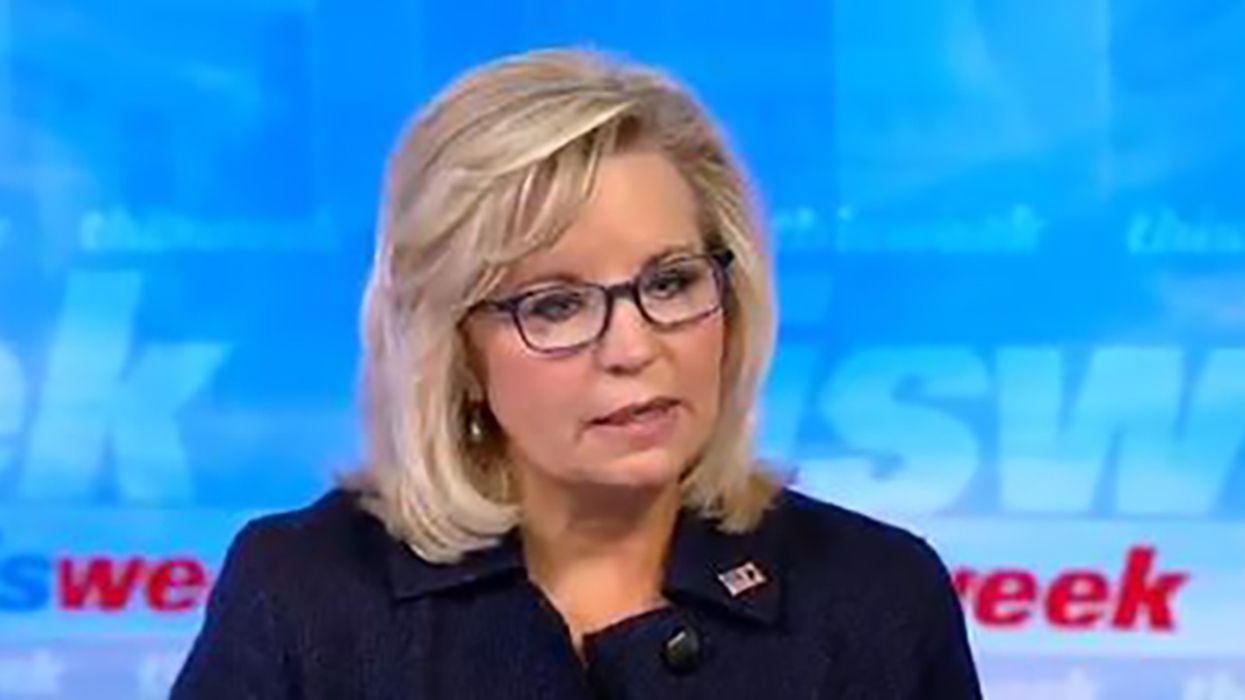Just what about Jan. 6 was ‘legitimate political discourse’?

Liz Cheney image via Screengrab
Why are House Democrats siding with Liz Cheney to prolong endless war in Afghanistan?
February 07, 2022 | 02:23PM ETCommentary
That description was meant to sideswipe Representatives Liz Cheney (R-Wyo.) and Adam Kitzinger (R-Ill.) for joining the select House committee to investigate who brought about “discourse” that saw thousands of Donald Trump fans breaking into the Capitol, threatening leaders, and resulting in deaths and injuries.
Politically, it is understandable, if disappointing, that the RNC wants to slap the pair for breaching what they see as a need to offer only unyielding defense of Trump’s continuing wails about losing the 2020 election. The rest of us see a kind of bravery in their decision to find out why Jan. 6 came about.
You might as well call Afghanistan an underrated tourist spot or suggest that North Korea is doing interesting engineering studies by launching test nuclear weapons.
But to call what is emerging and extensive coup plot as “legitimate political discourse” is just nuts. Apparently, even the RNC saw the need to clarify that language, saying it was never meant to apply to MAGA rioters who violently stormed the Capitol. But by omission, it was okay to call plotting to overthrow the Constitution and democratic elections “legitimate”? It was legit to plan and coordinate such a riot? It was okay to use the military to seize voting machines and file fake elector slates? It was all right to involve Republican congress members in a plan to overturn Electoral Votes?
Just what here is “legitimate political discourse”?
You might as well call Afghanistan an underrated tourist spot or suggest that North Korea is doing interesting engineering studies by launching test nuclear weapons.
I checked the right-leaning websites to see how they treated this formal arrival of doublespeak. Breitbart, Newsmax, OANN, which have all given extensive coverage to election-rigging claims and voice to those who decry investigation, all carried accounts of the voice vote to censure Cheney and Kinzinger but did not dwell on or explore the re-labeling of Jan. 6 as “legitimate.”
There now are so many coup plot line investigations afoot that the public hearings planned by the House committee are being delayed another couple of months.
On Friday, we saw even former Vice President Mike Pence publicly rebuke Trump as “wrong” in asserting that Pence could have overturned the election result. We heard more partial reports from now multiple investigations that put Trump at the center of a web of plans to send fake electors to Congress, to illegally consider using the military or other federal agencies to grab voting machines, to demand National Security Administration actions to find election fraud.
Taken together, the picture emerging is that election fraud manufacture was the only business being done in the White House.
Friday’s vote was dramatically different in tone from a statement the Republican National Committee released the day of the attack, when it said, “these violent scenes we have witnessed do not represent acts of patriotism, but an attack on our country and its founding principles.”
But, as we all painfully know, Trump makes it his business every day to insist that we all need to justify any action that would put him back in the White House – even as polling is beginning to show some cracks in his political base.
It’s all so inside-out that we need to stop periodically to remind ourselves what we all witnessed after November 2020 and through to the violence of Jan. 6. Thousands of Trump supporters stormed the Capitol that day, smashing windows, assaulting police officers and sending lawmakers and then-Vice President Mike Pence running for their lives.
That has led to this summary from Ronna McDaniel, RNC chairwoman: “Liz Cheney and Adam Kinzinger crossed a line. They chose to join Nancy Pelosi in a Democrat-led persecution of ordinary citizens who engaged in legitimate political discourse that had nothing to do with violence at the Capitol.”
Say what?
Look, let the RNC eat its own and issue its self-serving censure, itself apparently the result of intra-party negotiation over whether to expel Cheney and Kinzinger from their congressional caucus altogether. Cheney already faces a problematic re-election, and Kinzinger won’t run again anyway.
What’s more important here is that this is an attempt to minimize what happened on Jan. 6 and to keep alive as legitimate the still-baseless claims of widespread election fraud. In pursuit of those claims, states with Republican-majority legislatures are flooding us with laws to restrict voting in one fashion or another, but always affecting Democratic areas with concentrations of voters of color.
Amid the issues stemming from Covid, economy, international war and peace, Republicans apparently want the top-line concern to be a replay of an election more than a year old. As The Times summarized, “In approving [the censure resolution] and opting to punish two of its own, Republicans seemed to embrace a position that many of them have only hinted at: that the assault and the actions that preceded it were acceptable.”
It meshes perfectly with new promises from Trump himself, that if re-elected in 2024, he would consider pardons for those convicted in the Jan. 6 attack.
No problem ever gets resolved without acknowledging what went wrong, nor can there be any effective solution. Censuring, expelling, slapping two Republicans for taking part in a committee to ask questions doesn’t dismiss the extraordinary plot that apparently was under way to overturn our government.
Suddenly calling an insurrection-fueled riot at the Capitol “legitimate political discourse” doesn’t make it so.